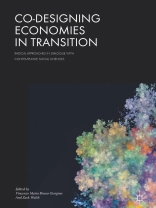This transdisciplinary volume puts forward proposals for wiser, socially just and sustainable socio-economic systems in transition. There is growing support for the view that the end of capitalism is around the corner, but on which conceptual and ethical basis can we interpret these times? With investigations into feminist economics, post-growth environmentalism, socio-technical digital design, collaborative and commons economics, the editors create a dialogue between radical knowledge/practices and contemplative social sciences to transgress disciplinary boundaries and implement new visions of reality. This important book challenges our ways of thinking and outlines a pathway for new research.
Chapter 13 of this book is available open access under a CC BY 4.0 license at link.springer.com
विषयसूची
Chapter 1. Introduction.- Part 1. Transdisciplinary Foundations for Contemporary Social and Economic Transformation.- Chapter 2. In Search of a New Compass in the Great Transition: Towards Co-Designing the Urban Space We Care About.- Chapter 3. Navigating the Great Transition via Postcapitalism and Contemplative Social Sciences.- Chapter 4. Having, Being, and the Commons.- Chapter 5. Par Cum Pari: The Value System of Commons-Based Peer Production and the Social Doctrine of the Catholic Church.- Chapter 6. Economics Beyond the Self.- Chapter 7. The Koan of the Market.- Chapter 8. Epistemology of Feminist Economics.- Chapter 9. How to Make What Really Matters Count in Economic Decision-Making: Care, Domestic Violence, Gender Responsive Budgeting, Macroeconomic Policies and Human Rights.- Chapter 10. Contemplative Economy and Contemplative Economics: Definitions, Branches and Methodologies.- Part 2. Collective Awareness, the Self, and Digital Technologies.- Chapter 11. From Smart Cities to Experimental Cities?.- Chapter 12. First Life: From Maps to Social Networks and Back.- Chapter 13. The Organic Internet: Building Communications Networks from the Grassroots.- Chapter 14. Technocratic Automation and Contemplative Overlays in Artificially Intelligent Criminal Sentencing.- Chapter 15. One Bright Byte: Dōgen and the Re-Embodiment of Digital Technologies.
लेखक के बारे में
Vincenzo Mario Bruno Giorgino is Aggregate Professor in the Department of Economic and Social Sciences at the University of Turin, Italy. For the past 20 years he has been working towards the integration of social sciences and contemplative knowledge in action-research and higher education.
Zachary David Walsh is Researcher at Claremont School of Theology, USA, and a research specialist at Toward Ecological Civilization, USA; the Institute for Postmodern Development of China, USA; and the Institute for Advanced Sustainability Studies, Germany.












